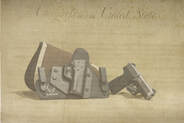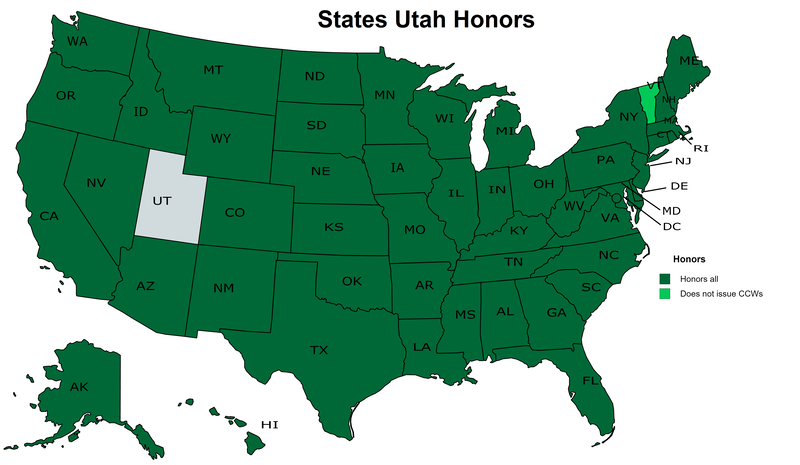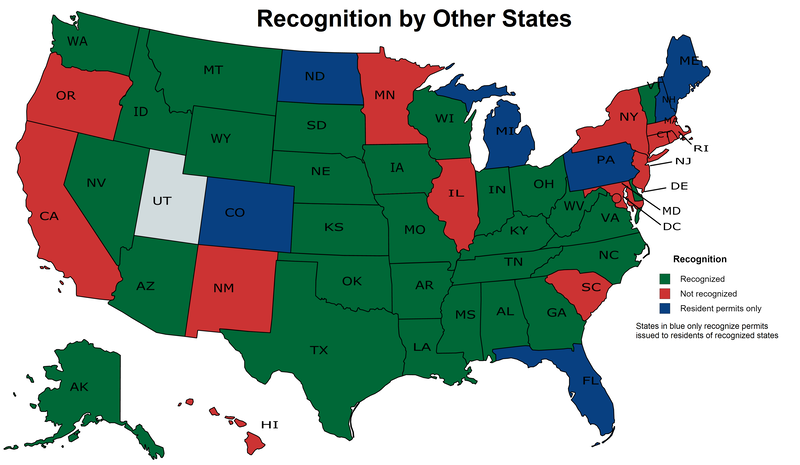Utah Concealed Carry
"Concealed firearm" means a firearm that is:
(i) covered, hidden, or secreted in a manner that the public would not be aware of its presence; and
(ii) readily accessible for immediate use.
(b) A firearm that is unloaded and securely encased is not a concealed firearm for the purposes of this part. 76-10-501(3)
Carrying a concealed firearm requires no longer requires a permit (as of May 2021 with constitutional carry). Carrying a concealed, unloaded firearm is a class B misdemeanor, whereas if the firearm is loaded, it is a class A misdemeanor. Carrying an illegal short-barreled shotgun or rifle or carrying a concealed firearm in the commission of a violent felony is a second degree felony. With constitutional carry, this really only applies to persons who cannot legally possess firearms. The exemptions are (76-10-504):
Domestic violence exemption: per 76-10-523(2)(b) amended by HB 243 (2019) persons who have been issued a domestic violence protection order may carry concealed without a permit for up to 120 days from the date of issuance of the order.
- At your residence or your private property;
- In or on a vehicle in your lawful possession or with the consent of the individual who is lawfully in possession of the vehicle;
- Or in a business under the person's control;
- While legally hunting, except within the limits of a municipality that prohibits hunting or on a highway.
Domestic violence exemption: per 76-10-523(2)(b) amended by HB 243 (2019) persons who have been issued a domestic violence protection order may carry concealed without a permit for up to 120 days from the date of issuance of the order.
"Printing," where the imprint of your gun shows through your clothing, is not illegal anywhere in the United States.
Constitutional Carry

Effective May 5, 2021, 2021’s HB 60 allows anyone 21 and older who may legally possess a gun to carry openly or concealed, with or without a permit. This only applies to those 21+. Those 18-20 who wish to carry a concealed firearm must obtain a Utah provision concealed weapon permit or carry openly, but without a round chambered. 76-10-523, Persons exempt from weapons laws, (from 2021’s HB 60) makes the legal changes to 76-10-504(1) & (2) [concealed firearms] 76-10-505(1)(b) [open carry]. 76-10-523(5) (from bill):
(5) Subsections 76-10-504(1) and (2), and 76-10-505(1)(b) do not apply to a person 21 years old or older who may otherwise lawfully possess a firearm.
Permits will still be issued, which allow the exemption from having background checks called in by gun stores (known as the Permanent Brady Chart), although the Form 4473 is still filled out, and allows reciprocity in a wide number of states that still require permits.
Permit Basics
The Bureau of Criminal Identification (BCI), a state agency, is responsible for issuing permits. The Bureau shall issue a permit to carry a concealed firearm for lawful self defense to an applicant who is 21 years of age or older within 60 days after receiving an application, unless the bureau finds proof that the applicant does not meet the qualifications. A regular permit is valid for five years. 53-5-704
Costs
The Bureau of Criminal Information changed the fee schedule. For statutory fees, see 53-5-707
Provisional Permits (18-20)
If you are 18-20, you may obtain a provisional concealed firearm permit. 53-5-704.5/HB198 (2017). You do not need to be Utah resident to obtain a provisional permit, however the same requirements for holding an in-state permit, if your home state recognizes Utah's permit, applies (see below). Provisional permittees 18-20 may not carry in a public or private elementary or secondary school or on the grounds (53-5-710), but this does not apply to colleges (see 76-10-505). Persons turning 21 may apply for a full permit 90 days before their 21st birthday (HB 216; 2021).
Permittees information are not public records subject to public inspection. 53-5-708
A concealed firearm permittee is exempt from firearm background checks and fees. 76-10-526
Costs
The Bureau of Criminal Information changed the fee schedule. For statutory fees, see 53-5-707
Provisional Permits (18-20)
If you are 18-20, you may obtain a provisional concealed firearm permit. 53-5-704.5/HB198 (2017). You do not need to be Utah resident to obtain a provisional permit, however the same requirements for holding an in-state permit, if your home state recognizes Utah's permit, applies (see below). Provisional permittees 18-20 may not carry in a public or private elementary or secondary school or on the grounds (53-5-710), but this does not apply to colleges (see 76-10-505). Persons turning 21 may apply for a full permit 90 days before their 21st birthday (HB 216; 2021).
Permittees information are not public records subject to public inspection. 53-5-708
A concealed firearm permittee is exempt from firearm background checks and fees. 76-10-526
Qualifications
The bureau may deny, suspend, or revoke a concealed firearm permit if the applicant or permit holder (53-5-704):
Moral turpitude includes, but is not limited to:
The bureau can find mitigating circumstances and issue a permit if the applicant was not convicted of a registerable sex offense and the following time periods have elapsed from the date the applicant was convicted or released from incarceration, parole, or probation, whichever occurred last:
Non-resident applicants
A non-resident applicant whose state recognizes the Utah permit shall:
- Has been or is convicted of a felony;
- Has been or is convicted of a crime of violence;
- Has been or is convicted of an offense involving the use of alcohol;
- Has been or is convicted of an offense involving the unlawful use of narcotics or other controlled substances;
- Has been or is convicted of an offense involving moral turpitude (i.e., theft, criminal mischief, sex crimes, etc.) ;
- Has been or is convicted of an offense involving domestic violence;
- Has been or is adjudicated by a state or federal court as mentally incompetent, unless the adjudication has been withdrawn or reversed;
- Is not qualified to purchase and possess a firearm pursuant to Section 76-10-503 and federal law;
- The applicant or permit holder has been or is a danger to self or others as demonstrated by evidence, including:
- past pattern of behavior involving unlawful violence or threats of unlawful violence;
- past participation in incidents involving unlawful violence or threats of unlawful violence; or
- conviction of an offense in violation of Title 76, Chapter 10, Part 5, Weapons.
Moral turpitude includes, but is not limited to:
- is done knowingly contrary to justice, honesty, or good morals;
- has an element of falsification or fraud; or
- contains an element of harm or injury directed to another person or another's property.
The bureau can find mitigating circumstances and issue a permit if the applicant was not convicted of a registerable sex offense and the following time periods have elapsed from the date the applicant was convicted or released from incarceration, parole, or probation, whichever occurred last:
- Five years in the case of a class A misdemeanor;
- Four years in the case of a class B misdemeanor; or
- Three years in the case of any other misdemeanor or infraction.
Non-resident applicants
A non-resident applicant whose state recognizes the Utah permit shall:
- Hold a current concealed firearm or concealed weapon permit issued by the appropriate permitting authority of the nonresident applicant's state of residency; and
- Submit a photocopy or electronic copy of the nonresident applicant's current concealed firearm or concealed weapon permit.
Training
Firearm familiarity training must include:
- The safe loading, unloading, storage, and carrying of the types of firearms to be concealed, including:
- The safe, effective, and proficient use and handling of firearms;
- Firearm draw strokes;
- The safe loading, unloading and storage of firearms;
- The parts and operation of a handgun;
- Firearm ammunition and ammunition malfunctions, including misfires, hang fires, squib loads, and defensive/protection ammunition vs. practice ammunition;
- Firearm malfunctions, including failure to fire, failure to eject, feed way stoppage and failure to go into battery;
- Shooting fundamentals, including shooter's stance, etc.;
- Firearm range safety rules; and
- A practical exercise with a proficiency qualification course consisting of not less than 30 rounds and a required score of 80% or greater to pass.
- Current gun and self-defense laws.
Appeals
The bureau has 60 days to issue or deny a permit. In the event of a denial, suspension, or revocation of a permit, the applicant or permit holder may file a petition for review with the board within 60 days from the date the denial, suspension, or revocation is received by the applicant or permit holder by certified mail. The board has 30 days to issue its final decision, which can be appealed for judicial review if petitioned for within 30 days. 53-5-704 and UAC R722-300-10
Temporary Permits
The bureau may issue a temporary concealed firearm permit to an applicant for a permanent permit when one requests a temporary permit and demonstrates extenuating circumstances that would justify issuing a temporary permit. Preliminary record checks are still made. Temporary permits are valid for a maximum of 90 days. 53-5-705
Forms and applications are available at the BCI pages

Can I carry a concealed handgun in a car without a permit?
Yes. 76-10-504 and 76-10-505 do not not prohibit a person from carrying a concealed firearm, a loaded handgun or any unloaded firearm (including unloaded rifles and shotguns), in a vehicle in the person's lawful possession or with the consent of the individual who is lawfully in possession of the vehicle. The firearm may be concealed on your person. The 76-10-504 exemption to the permit requirement applies only to "in or on a place other" than the vehicles mentioned above, in addition to a person's residence, business, or private property.
If the police detain me, do I have to tell them I have a gun?
Utah has no law requiring permittees volunteer to an officer that they have a firearm in the vehicle. The Utah BCI recommends (oriented to concealed firearm permittees):
Yes. 76-10-504 and 76-10-505 do not not prohibit a person from carrying a concealed firearm, a loaded handgun or any unloaded firearm (including unloaded rifles and shotguns), in a vehicle in the person's lawful possession or with the consent of the individual who is lawfully in possession of the vehicle. The firearm may be concealed on your person. The 76-10-504 exemption to the permit requirement applies only to "in or on a place other" than the vehicles mentioned above, in addition to a person's residence, business, or private property.
If the police detain me, do I have to tell them I have a gun?
Utah has no law requiring permittees volunteer to an officer that they have a firearm in the vehicle. The Utah BCI recommends (oriented to concealed firearm permittees):
Although there is no legal requirement to identify yourself to a law enforcement officer, it is recommended to do so.
If an officer finds or sees a gun on your person during their contact with you, and you have not identified yourself as a permit holder in legal possession of a firearm, the officer may assume you are carrying the gun illegally and may take defensive action. For the safety of all involved, it is recommended to immediately identify yourself to the officer as a permit holder in possession of a handgun. This action gives the officer some assurance they are most likely dealing with a law abiding citizen.
Reciprocity
Non-residents must have a permit in their state before applying for a Utah permit unless that person's state does not recognize Utah's permit (red states). Utah recognizes all US concealed firearm permits. Nevada will no longer recognize the Utah provisional permit effective 7/01/2021. 76-10-523(2)(b)
Concealed carry is better than open carry because surprise will work to my advantage.
The idea behind this is that an openly carried weapon may make the carrier a primary target of the criminal/terrorist. The concealed carrier would blend in with the crowd, and then draw at when it was to their advantage.
This assumption is generally false in the absence of evidence that an openly carried weapon leads to victimization. Abundant evidence is available that open carry is indeed a deterrent to crime. Concealed carry lacks that deterrent factor. The 'gray man' element, appearing unremarkable and blending in with the crowd, only has application when one may be specifically sought out; such as in the case of a police officer. The desire not to be spotted carrying a firearm or otherwise identified typically comes from the police influence in the concealed carry training world.
The advantage of concealed carry lies in the fact that it may be possible to carry in places where open carriers would be shunned or asked to leave. Legally speaking, the advantage is with open carry, yet due to modern sensitivities, the discreet option of undetected concealed carry would prevent any debates with anti-gunners or objections to having the weapon on private property where the owner/management might prohibit it. Also, given one’s choice of dress or activities, concealed carry may be more appropriate.
The debate is largely a matter of taste and environment. A citizen carrier with anti-gun customers or friends may want to protect themselves without alienating others. Some may feel uncomfortable carrying openly. Whatever the choice, it is a personal one and not to be judged or criticized.
Open carry and concealed carry each have their own unique advantages and disadvantages; neither is inherently superior to the other. Both methods complement each other and allow for flexibility in self-defense.
The idea behind this is that an openly carried weapon may make the carrier a primary target of the criminal/terrorist. The concealed carrier would blend in with the crowd, and then draw at when it was to their advantage.
This assumption is generally false in the absence of evidence that an openly carried weapon leads to victimization. Abundant evidence is available that open carry is indeed a deterrent to crime. Concealed carry lacks that deterrent factor. The 'gray man' element, appearing unremarkable and blending in with the crowd, only has application when one may be specifically sought out; such as in the case of a police officer. The desire not to be spotted carrying a firearm or otherwise identified typically comes from the police influence in the concealed carry training world.
The advantage of concealed carry lies in the fact that it may be possible to carry in places where open carriers would be shunned or asked to leave. Legally speaking, the advantage is with open carry, yet due to modern sensitivities, the discreet option of undetected concealed carry would prevent any debates with anti-gunners or objections to having the weapon on private property where the owner/management might prohibit it. Also, given one’s choice of dress or activities, concealed carry may be more appropriate.
The debate is largely a matter of taste and environment. A citizen carrier with anti-gun customers or friends may want to protect themselves without alienating others. Some may feel uncomfortable carrying openly. Whatever the choice, it is a personal one and not to be judged or criticized.
Open carry and concealed carry each have their own unique advantages and disadvantages; neither is inherently superior to the other. Both methods complement each other and allow for flexibility in self-defense.

